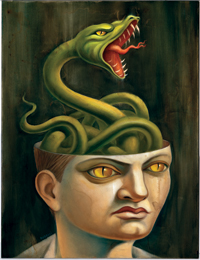| Site Map | Contacts | Links | Newsletter | |
Scientific Theology
The Science of Sin (Hamartiology- Study of Sin)

I Didn't Sin—It Was My Brain
Brain researchers have found the sources of many of our darkest thoughts, from envy to wrath. Why does being bad feel so good?
by Kathleen McGowan; illustrations by Christopher Buzelli
From the September 2009 issue of Discover Magazine, published online October 5, 2009
The New Science of Temptation
What happens when Harvard scientists use a brain scanner to look for the devil inside?
By Piercarlo Valdesolo Scientific American Magazine
"A new brain imaging study by Josh Greene and Joe Paxton at Harvard University published in the Proceedings of the National Academy of Sciences suggests that what separates the well-behaved from the poorly-behaved might not be the ability to control your temptations but rather what kind of temptations you have."
The Science of Evil
“The Science of Evil,” by Simon Baron-Cohen. Dr. Baron-Cohen, a professor of developmental psychology at the University of Cambridge and director of the university’s Autism Research Center, proposes that evil is more scientifically defined as an absence of empathy, exacerbated by negative environmental factors (usually parental, sometimes societal) and a genetic component. When these three exist in tandem they result in what he calls a Zero-Negative personality. Zero-Negative takes at least three forms (and possibly more), borrowing from terms used in psychiatry: Zero Type P (psychopathology), Zero Type B (borderline disorder) and Zero Type N (narcissism).
Sins of the Grandfathers
What happens in Vegas could affect your offspring. How early-life experiences could cause permanent changes in sperm and eggs.
Michael Skinner has just uttered an astounding sentence, but by now he is so used to slaying scientific dogma that his listener has to interrupt and ask if he realizes what he just said. Which was this: “We just published a paper last month confirming epigenetic changes in sperm which are carried forward transgenerationally. This confirms that these changes can become permanently programmed.”
Is Morality Innate and Universal?
Hauser argues that millions of years of natural selection have molded a universal moral grammar within our brains that enables us to make rapid decisions about ethical dilemmas.
The Science of Man (Anthropology- Study of Man)
by Josie Glausiusz
From the September 2001 issue of Discover Magazine, published online September 1, 2001
You might not guess it from all the wars that pockmark the planet, but neurobiologists Jean Decety and Perrine Ruby of Inserm, the French Institute of Health and Medical Research in Lyons, say humans have an empathy instinct hardwired into the brain.
Science Finds God (In the Brain, at Least)
fMRI scans showed thoughts of God brought activation of particular neural pathways, including those in the anterior prefrontal cortex.
by Allison Bond
From the January-February special issue, published online December 16, 2009
Do You Have Free Will? Yes, It’s the Only Choice
By JOHN TIERNEY Published: March 21, 2011 New York Times
“Doubting one’s free will may undermine the sense of self as agent,” Dr. Vohs and Dr. Schooler concluded. “Or, perhaps, denying free will simply provides the ultimate excuse to behave as one likes.”
“Free will guides people’s choices toward being more moral and better performers,” Dr. Vohs said. “It’s adaptive for societies and individuals to hold a belief in free will, as it helps people adhere to cultural codes of conduct that portend healthy, wealthy and happy life outcomes.”
More to come!
